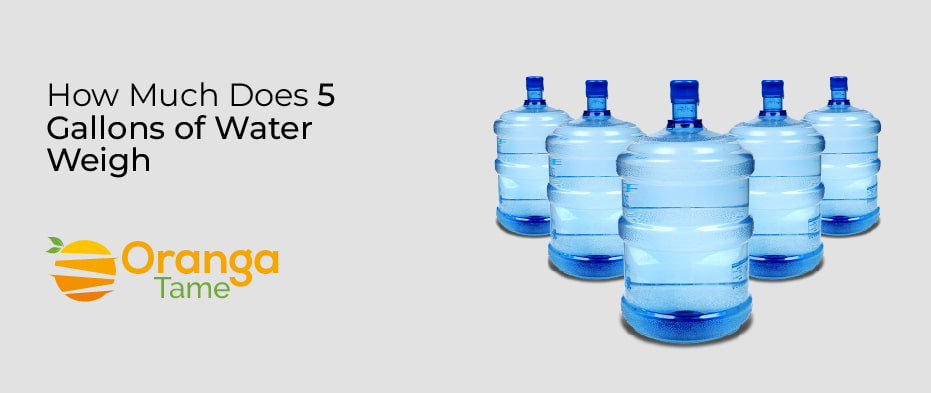Table of Contents
In the United States on average a gallon of water weighs 8.34 pounds. Now add five gallons on US average—you will get the answer of 41.7 lbs. On the other hand, British Imperial Gallon weighs 10 pounds. On average, translating this into 5 imperial gallons weigh not more than 10 pounds further more when compared to five US gallons. You can see ‘on average’ is repeatedly used due to the weight of water is not static and can be subject to a different temperature.
Understand the Chemistry of Water
The world is approximately covering about 70% of the world’s surface. This source is the most available molecule on the planet Earth. Not to mention, water is the only chemical compound on the Earth that is in the form of all three states i.e., solid, liquid, and gas.
The golden chemical formula of H20 is H20. If one breakdown this formula: H means the hydrogen while the 2 denotes the number of hydrogen atoms, and O stands for a single oxygen atom. All these atoms are helped glued with covalent bonding which explains these atoms also share electrons within them.
The density of water is another unique characteristic of its. Meaning when the water is in frozen solid its density is less as compared to when it is in liquid form. An example of it can be gleaned from the ice cube floating in beverages. The chemical substance, Water, can also be utilized as a coolant due to its remarkable capability of soaking heat.
Temperature and Its Effects on the Water
Given the several properties of water, like composition, density fluctuates, and varied changes in temperature make the densityfluctuate. Understandably, water density becomes the heaviest when it is cold. Also, following this line, ice becomes lighter than the cold water because when it freezes some of the density due to these losses. Hence, cold water is far denser than warm water and especially water and especially when water is mere up the freezing point.
The phenomena of thermal fluctuations are the reason behind water molecules start to collide with each other. As far as the water weighed in a contained space is concerned, in a gallon container where together with the weight of the water, density, in addition with thermal changes; primarily fluctuates.
The Temperature on Water: Different Effects
Besides, mainly changing both the weight and density of water alike, there is another feature which affects them also: Thermal Changes. Moreover, groundwater can contain and dissolve minerals at a higher rate and temperature from underground rocks. Thus, the electrical conductivity of the higher water temperature increases.
Thermal fluctuations, however, can have a significant effect on aquatic life. The main difference between cold and warm water is the former contains more oxygen. Moreover, when the water of the temperature becomes hot the compounds present in the water become toxic. hence endangering the aquatic life.
FAQ: How much does 5 gallons of water weigh in Pounds and Kilos
| Weight in pounds for gallons of water | ||
| Gallons of water | Pounds | Kilos |
| 1 gallon | 8.33 lb | 3.78 kg |
| 2 gallons | 16.66 lb | 7.56 kg |
| 3 gallons | 24.99 lb | 11.33 kg |
| 4 gallons | 33.32 lb | 15.11 kg |
| 5 gallons | 41.64 lb | 18.89 kg |
| 6 gallons | 49.97 lb | 22.67 kg |
| 7 gallons | 58.3 lb | 26.45 kg |
| 8 gallons | 66.63 lb | 30.22 kg |
| 9 gallons | 74.96 lb | 34 kg |
| 10 gallons | 83.29 lb | 37.78 kg |
| At room temperature (70°F or 21°C). Density of 0.998g/cm³ | ||
How Much Does 5 Gallons of Water Weigh in Pounds?
A gallon of water is approximately around 4 quarts or approx. 8 pints. Keeping that in mind, a gallon weighs in pounds at a total of 8. Therefore, five gallons are to be 18.9 liters.
How Much Does 5 Gallons of Water Weigh: Conclusion
In this guide on ‘How Much Does 5 Gallons of Water Weigh’, weighing water in different measurements. Besides, explained the complex nature of water.

